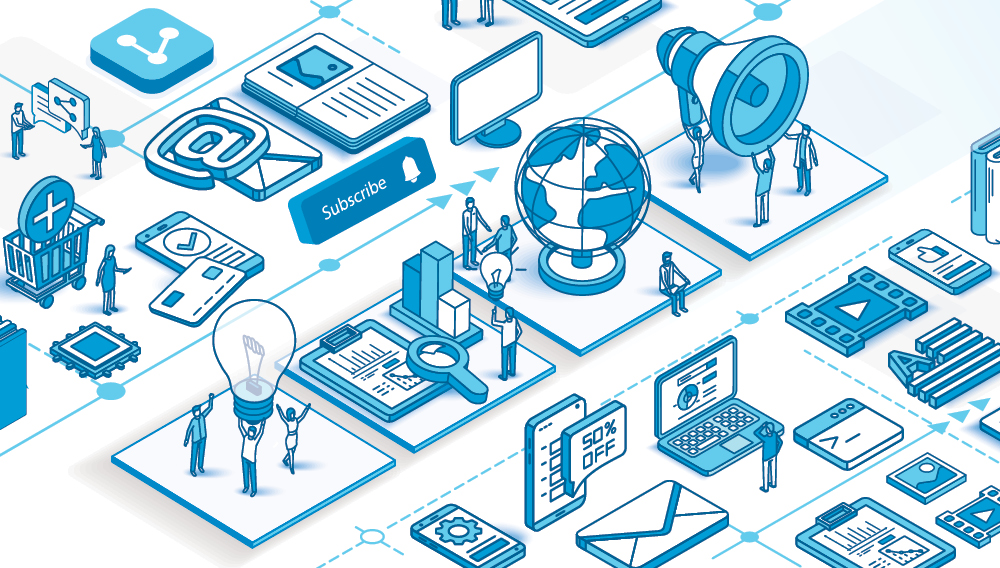Traditional Marketing vs. Digital Marketing

The pair of sneakers advertised in the magazine in your dentist’s office; the 15-second ad about a new weight loss medicine popping up as you scroll on Facebook; the picture of a faraway beach, as well as the travel agency that can get you there, on the bus passing on the street—all of these are examples of marketing. Marketing involves promoting, selling, and distributing a product or service that customers desire.
Traditional marketing and digital marketing are the two types of marketing that businesses use to connect to their consumers. Let’s take a closer look at them.
What Is Traditional Marketing?
Traditional marketing as we know it can essentially trace its roots back to the 1950s, when television gained massive popularity. As opposed to newspapers and other print media, companies could reach larger audiences in their homes with television. As you might have guessed by now, this type of marketing involves any offline, nondigital method to advertise products and services. Some specific examples include:
- Print marketing. This involves advertising in newspapers, magazines, brochures, posters, etc.
- Broadcast marketing. Television and radio advertising can reach greater audiences than other traditional means.
- Direct mail. Some businesses send letters, catalogs, etc. directly to consumers.
- Outdoor marketing. Examples of outdoor advertising are billboards, banners, ads on public transportation, and signs.
- Cold calling. Another popular traditional marketing strategy involves reaching out to consumers via phone calls.
Key components of traditional marketing are that it usually involves tangible products and is targeted to a specific geographic area or audience.
What Is Digital Marketing?
On the other hand, digital marketing uses the internet and other digital strategies to reach consumers. This type of marketing has become increasingly popular with the growth of the Internet of Things (IoT), AI in marketing, and the overall ability to connect faster and easier with others. This type of marketing includes:
- Content marketing. This refers to developing and sharing content in blogs, videos, infographics, etc. for lead generation.
- Social media marketing. Promoting products and branding efforts using social media platforms like Facebook, Instagram, LinkedIn, TikTok, and more can be effective.
- Pay-per-click (PPC) advertising. PPC includes running ads on platforms like Google, Meta, and Bing to drive more traffic to your product or service.
- Search engine optimization (SEO). Optimizing your website content, as well as making it easier to engage with, can result in improved search engine rankings and lead generation.
- Mobile marketing. This involves reaching consumers through applications, SMS, or push notifications.
- Affiliate marketing. This means collaborating with industry experts, social media influencers, and other third-party members to promote your product in exchange for compensation.
- Analytics. You can measure the success of digital marketing campaigns through digital analytics tools like Google Analytics to track consumer behavior, return on investment (ROI), and overall campaign performance.
Which One Is Better Suited for Your Business?
What type of marketing works better for your business depends on the audience you want to reach and what kind of product or service you’re selling. Traditional marketing can effectively reach audiences who are less engaged with the internet; however, communication with consumers is usually one-sided. With digital marketing, campaign success can be easier to evaluate, but strategy and creativity are required to stand out in an already crowded online space.
Combining digital and traditional marketing can be the most effective way to reach consumers. Using both strategies together is called integrated marketing. Successful businesses use various traditional and digital marketing techniques in harmony to reach their target audience.
What Skills Do You Need for a Career in Marketing?
If you’re ready to enter the world of marketing, take note: You need a degree in marketing, business, or a related field to get started, and it also would benefit you to possess certain traits and skills, including:
- Good communication
- Creativity
- Attention to detail
- Adaptability
- Leadership skills
- Interpersonal skills
- Project management
- Analytical knowledge
- Social media knowledge
Are you ready for a career in marketing? Get started with a business degree and be prepared to use traditional and digital marketing in your branding and lead generation efforts.



